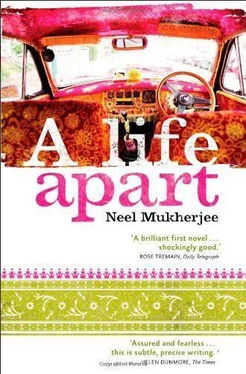Mr Roy Chowdhury’s note, in neat, firm copperplate, arrives next morning, with a pile of Dawn back issues going back to 1897. It is brief and warm:
I shall be delighted to take afternoon tea with you the following Wednesday. I apologize for my negligence and absence — there have been too many things demanding my attention of late and I have been inundated by these pressing duties. If you so desire, we might even go for a ride by the river. Will you kindly let me know? Yours ever, etc.
Miss Gilby opts for the ride and sends a note with Lalloo who has evidently been instructed to wait for her reply. The rest of the morning, and a large part of the afternoon, is taken up with Dawn . What Miss Gilby assimilates during that time — and it is only a tiny fraction of the surging sea around her — makes her head spin. She reads about English-educated Indians raging about the contrast between the prosperous West and destitute India, about how this is no fate-ordained thing but a deliberate tool of British policy. She learns about the premeditated destruction of Indian handicrafts leading to an overwhelming dependence on agriculture, which in turn has been ruined by an excessive land tax. And then there was the wealth drain in the form of first investment and later home charges, which India was meeting only through a harmful and deceptive export surplus. India had thus been reduced to the status of supplier of raw materials and market for British-manufactured goods.
Page after page she is taken through the need for industrialization, the promotion of technical education, demands for the government to abolish its anti-Indian tariff policy. She learns of self-help, boycott of British goods, increasing reliance on home-produced things, all of which constitute swadeshi . She uses her burgeoning knowledge of Bengali to translate it as ‘of one’s own country’, ‘native’, ‘indigenous’. She even knows its antonym: bideshi , foreign. She reads Bholanath Chandra’s rallying cry to dethrone ‘ King Cotton of Manchester’. It would be no crime for us to take the only but most effectual weapon of moral hostility, left us in our last extremity. Let us make use of this potent weapon by resolving to non-consume the goods of England.
Amidst the long names of Bengali intellectuals — Satishchandra Mukherji, Jogindranath Chattopadhyay, Motilal Ghosh, Kaliprasanna Dasgupta — she notices the flash and shine of two familiar names, Violet Cameron and Nikhilesh Roy Chowdhury, dart through the thicket of words like gleaming fish through dark reeds.
Miss Gilby feels the oppressive heaviness that comes with such a deep and total immersion in a field hitherto largely unknown to her but with it also comes, paradoxically, a liberating lightness conferred by that very activity, for it has resulted in an intellectual endeavour that initiates the long but ultimately victorious battle with ignorance. From now on, she will involve herself in the thick and press of this germinating revolution. No sooner has she made up her mind than another, more nebulous, feeling assails her, a feeling for which she fails to find either a name or a phrase. She feels oddly divided, melancholy, as if her loyalties were neatly riven and have been called into question, as if two equal forces were pulling her in contrary directions. The sense of implied betrayal she feels is already enormous.
At lesson the next day, Bimala and Miss Gilby toil over an English translation of a Rajput story — the one of Queen Padmini, reputed to be so beautiful that when she took her early morning walks in the arbours and waterways of the palace in Chitorgarh lotus buds refused to blossom lest she put their collective splendour to shame. The Bengali is very difficult for Miss Gilby. There are problems with the language — simultaneously both poetic and innocent, intricate and childlike — the metaphors and the idioms that don’t quite translate, but as Bimala, slowly and surely, unfurls the story, shaking it out open from its neat, compact folds into a dazzling fabric sewn with every colour and skill imaginable, Miss Gilby falls under its spell.
They have reached the point at which Alauddin Khilji, Emperor of Hindustan, hears of the famed beauty of Padmini, hidden away in the proud and unassailable Rajput stronghold of Chitorgarh, a land that has stubbornly resisted the steady Muslim incursion throughout Hindustan, holding up its militant head defiant and high. The Sultan of Delhi marches towards Rajputana with five hundred thousand soldiers, razing and laying to waste everything they pass, intent on reaching Chitorgarh and abducting Padmini by sheer, brute force. As news reaches Chitorgarh that the Muslim army is advancing towards the town, Rana Lakshman Singh orders the seven iron gates of the town to be shut to the invaders.
Alauddin had thought it would be a child’s task to march into Chitorgarh and grab Padmini. But arriving at this hilltop town he found that just as the cage of ribs enclose and hide the heart, in a similar way Padmini was protected by the bristling swords of the brave Rajputs, Bimala and Miss Gilby translate together. Crossing the tempestuous seas was easy compared with crossing those seven iron gates of Chitorgarh to get to Padmini. The Pathan emperor ordered his troops to set up camp at the base of the hill.
At night, when Padmini and her husband, Rana Lakshman Singh, are taking the air on the crenellated parapets and terraces of the castle, the night air of the desert biting, the moon a bright, bitten nail in the clear black sky, she suddenly points a finger down to the vast desert outside and exclaims with delight, ‘Rana, Rana, look at those waves! It’s magic, the sea has arrived at our doorstep.’ The Rana replies sadly, ‘Padmini, those are not the waves of the sea but the tents of Alauddin’s army laying siege to our town.’
The following morning, the Rana sends his messenger to the Emperor. Alauddin’s wishes are simple. ‘I have no bone to pick with the Rana,’ he tells the messenger, ‘I’m here for Padmini. Hand her over and we’ll depart peacefully.’ The messenger replies, ‘Your Majesty doesn’t seem to be very familiar with our Rajput nation. We would rather give our lives than surrender our honour.’ Alauddin interrupts, ‘The mind of the Sultan of Delhi is unswerving — Padmini or war.’ The messenger bows and leaves.
The army of the Delhi Sultanate continues with its siege of the fortress of Chitorgarh for a year but there is no sign of the Rajputs relenting or asking for a truce. Alauddin’s hopes of starving the besieged Rajputs have, by the turn of the year, turned to ashes. And he still hasn’t set eyes upon this fabled beauty. Meanwhile, his soldiers are getting restless and bored: they murmur against their lot, the desert country they find themselves in, the obstinacy of these Rajput warriors, the lack of comfort and luxury they are used to in Delhi. Alauddin takes note of this growing disenchantment and hits upon another plan to get his way.
He sends word to Rana Lakshman Singh that he will return to Delhi with his soldiers if he is granted the sight of Padmini in a mirror: just a reflection of her will satisfy him. And while he is inside the fortress, the Rana shall be held personally responsible for the Sultan’s safety. The Rajputs agree readily to this compromise. Alauddin silently congratulates himself on his shrewdness: never in his wildest dreams had he imagined that this race of hardy warriors could be duped so easily.
The day arrives. The Pathan Sultan bathes in rose water, adorns himself in silks, pearls and emeralds. He departs for Chitorgarh castle accompanied by two hundred of his toughest soldiers, men who laugh at danger and death. Alauddin takes the steep, narrow road up to the fortress while his horsemen hide in the forests at the bottom of the hill. By the time he reaches the fort, another dark, chilly desert night has descended.
Читать дальше












